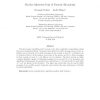Free Online Productivity Tools
i2Speak
i2Symbol
i2OCR
iTex2Img
iWeb2Print
iWeb2Shot
i2Type
iPdf2Split
iPdf2Merge
i2Bopomofo
i2Arabic
i2Style
i2Image
i2PDF
iLatex2Rtf
Sci2ools
113
click to vote
WDAG
1999
Springer
1999
Springer
Generic Broadcast
This short paper establishes lower bounds on the time complexity of algorithms solving the generic broadcast problem. The paper shows that (a) to deliver messages in one round, no failures can be tolerated, (b) to deliver messages in two rounds, at most f < n/3 failures can be tolerated, where n is the number of processes in the system, and (c) to deliver messages in three rounds, at most f < n/2 failures can be tolerated. The lower bounds are tight: a simple algorithm capable of delivering messages in one round if f = 0 is presented, and algorithms solving generic broadcast in two rounds when f < n/3 and in three rounds when f < n/2 are known in the literature. The paper also shows that even in runs in which messages do not conflict, generic broadcast cannot achieve the same performance of reliable broadcast algorithms.
Related Content
| Added | 05 Aug 2010 |
| Updated | 05 Aug 2010 |
| Type | Conference |
| Year | 1999 |
| Where | WDAG |
| Authors | Fernando Pedone, André Schiper |
Comments (0)

